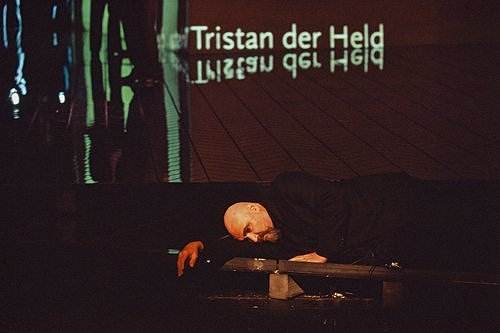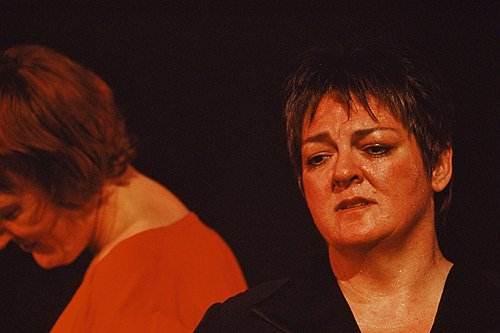|
Seen
and Heard International Opera Review
Wagner, Tristan
und Isolde,
Stuttgart State Opera, 18th July, 2004 (SM)
Conductor: Lothar Zagrosek
Director: Luk
Perceval
Sets: Annette
Kurz
Costumes: Ursula
Renzenbrink
Tristan: Gabriel
Sade
King Marke: Attila
Jun
Isolde: Lisa Gasteen
Kurwenal: Wolfgang
Schoene
Brangaene: Michaela
Schuster
Shepherd: Roderic
Keating
Steersman: Michael
Nagy
A young sailor:
Daniel Ohlmann
German opera is
hitting the headlines this summer like never
before. Shock Catalan director Calixto Bieito
is pulling in the crowds at Berlin's Komische
Oper with his sex-and-splatter version of
Mozart's "Entfuehrung aus dem Serail".
Bieito's reading,
which turns the Seraglio into a whorehouse
where pimps force prostitutes to drink piss,
then slice off their nipples and cut their
throats, even made it to the front page of
the mass-circulation daily Bild, Germany's
answer to the Sun.
And
Christoph Schlingensief's media circus is
currently working at full pelt to ensure that
his new staging of "Parsifal" will be a showdown
of one sort or another at this year's Bayreuth
Festival. The
self-styled enfant-terrible of German theatre
is doling out interviews by the dozen to any
high, middle or low-brow publication that
will print him.
But down in Stuttgart,
Belgian theatre auteur Luk Perceval is quietly
proving that modern operatic stagings can
be intellectually provocative and visually
arresting without all the excess trappings
of sado-masochistic sex, violence, nudity
or different bodily secretions and/or excretions
to shock and scandalise the audience and the
tabloids. In
fact, Perceval's staging at the Stuttgart
State Opera could possibly be the best "Tristan"
I've seen.
Perceval, actor,
director and auteur, is a newcomer to music
theatre. But
his love of, and long experience with working
with the spoken word, gives us a performance
in which Wagner's own text -- quite literally
-- takes centre stage.
In his programme
notes, Perceval complains that the words often
get lost in opera.
His solution is
breathtakingly simple. He places the singers
at the very front of the stage and allows
them to face the audience directly when they
sing.

He demands no
exhausting, ungainly acrobatics to twist and
cut off the column of air that a singer so
vitally needs. And
Perceval projects extracts of the text directly
onto the minimal sets, clearly readible and
accessible to the audience, who don't have
to crick their nicks trying to catch surtitles.
Stuttgart
isn't a huge theatre, anyway, so the chances
that the words can be heard are greater than
in other cavernous houses.
But Perceval makes
sure that almost every word is audible in
this sparse, intellectually rigorous "Tristan",
a paradigm of "Textverstaendlichkeit".
(It was all the
more ironic, then, that Lisa Gasteen's Isolde
and Gabriel Sade's Tristan needed such audible
prompting during the first two acts in the
performance I saw.)
Annette Kurz's
stripped-down sets only enhance our concentration.
A gigantic cube
dominates the right of the stage in Act I.
A
black wall stands centre stage in Act II,
with the singers moving around behind and
in front of it.
And in Act III,
the same wall is then lifted and tilted at
angle to become a sky filled the stars.
That's it. There's
no ship, no magic potion, no Castle Kareol
to distract us.
Perceval believes
that by refusing to place the action in any
identifiable time, by refusing to provide
any illustrative, or narrative clues, he won't
detract from the authenticity of Wagner's
music.
The costumes by
Ursula Renzenbrink, are equally minimalistic
-- timeless black for everyone except Brangaene
(Michaela Schuster) in blood red and King
Marke in linen beige.
That's because
Perceval views Brangaene and Marke as the
more interesting characters in the plot.
"They're the ones
who move me most deeply, because they have
to continue living and bearing the unbearable
lightness of being. They can't sing out their
deepest secrets in death arias," the director
writes.
This zen-like
treatment of one of Wagner's most zen-like
operas certainly works, if you're prepared
to let it. Musically,
you have no choice anyway. Lothar Zagrosek's
reading of the score is vital and alive, tripping
almost lightly through the Vorspiel, to plunge
us all the more deeply into the dark depths
of Act III, with the Stuttgart orchestra in
stunning form.
Lisa
Gasteen was a whirlwind of an Isolde, every
inch up to the taxing part, wild, passionate,
and then vulnerable and delicate in turn.
Gabriel Sade was
an autumnally hued, almost baritonal Tristan,
but he overspent himself in Act II, so that
his voice cracked altogether in Act III.
Atilla Jun's booming
bass gave us an impressive, if rather rigid
King Marke, while Wolfgang Schoene was a characterful
Kurwenal. The
star of the evening was Michaela Schuster's
Brangaene, with her gloriously rich mezzo,
so secure and rounded in tone. And she can
act, too. More
please.

Simon
Morgan
Back to the Top
Back
to the Index Page
|




